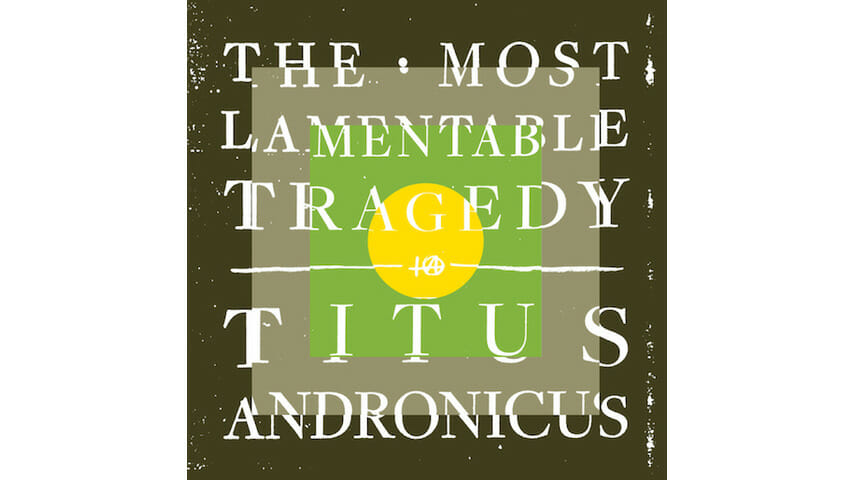Patrick Stickles, frontman and songwriter of Titus Andronicus, is the sort of punk who probably reads Lincoln biographies or Nietzsche treatises while Hüsker Dü plays in the background. The band made its name with a sophomore LP, The Monitor, which drew pictures of the Civil War with power chords and jagged solos. The follow-up, Local Business, was a crash course in existentialism and hopelessness paired with music more triumphant than its lyrics would suggest. Now we have The Most Lamentable Tragedy. It’s nearly 100 minutes in length, and only about 10 of them aren’t engaging to the nth degree: those 10 are the minutes of silence marked “Intermission” in the middle of the record.
Each Titus Andronicus record is multidisciplinary. You get some history lessons, philosophical inquiries, explosions of English wordplay and plenty of music theory. It only makes sense their records’ durations stretch out since they’ve got so much to pack in them. Stickles is a guy writing lyrics off the page and struggling to fit them all into the melody. Even when his suitcase is crammed to the point of explosion though, he’s a master of his craft. He never wastes or recycles; he just uses more than most.
The Most Lamentable Tragedy is pretty uniform in its subject matter but ready to drive down any street in order to convey it. Where The Monitor gave us Stickles’ interests and Local Business his ideas, this one seems to give us his self. Whether the narrator of these songs diverts from Stickles’ actual personality or not is impossible to decipher (we’re not Patrick Stickles and it sometimes seems like he doesn’t think he is either) but it sounds pretty genuine even if it’s fictive. Any variation on the word self is most likely written about here: self-pity, self-love, self-loathing, selfishness, selflessness, etc. Best of all, it’s very self-aware. Stickles puts it all on the table, ready to blame, excuse, forgive and destroy himself perhaps as an example for us when we’re trying to decide how to deal with our own imperfections.
There are some imperfections on the record too. Titus Andronicus is still best at rock and roll. There are some Celtic dirges and accordion-centered tracks along the way that seem like earnest ideas but ultimately aren’t there for much more than a deepening in mood. They’re fine if you want to hear the whole record from start to finish, but if you’re just picking favorite songs, they probably won’t be among them. But their mastery of nearly every rock style is pretty staggering. There are Hüsker Dü hardcore punk blasts, Thin Lizzy dueling guitars, Elvis Costello wordplays-and-whimsies, Bruce Springsteen hopeful grandiosities—and Titus Andronicus is capable of making all of them sound like they came up with all this stuff first.
You can’t talk about a Titus Andronicus album without discussing what Stickles wants to lay out for you. By the end of the first track featuring vocals, “No Future: Part IV,” Stickles is concluding his initial observations with the repeated shriek “I hate to be awake.” That doesn’t stop him from spending the rest of the album trying to figure out a way through wakefulness without going completely insane. The jumpy and instantly catchy “I Lost My Mind” (the first track of that title, the second being a brief cover of a Daniel Johnston song) finds him trying to decide whether he minds losing his mind or not. Sometimes the answer is yes, sometimes it’s no, but there’s no denying he is losing his mind every step of the way. “Dimed Out,” the record’s first single, is about turning life up to level 10. It’s also a pretty fitting description of the the album’s sound overall.
The last song on the album is entitled “A Moral,” and it’s without lyrics. The moral, seemingly, is one big inhale and exhale over some noise. Is this Stickles saying to take your last breath or another one to start another day? It’s up to you, and I think that’s how a good existentialist like Stickles would want it. When records like this exist in the world, it’s pretty easy to choose the latter option.
